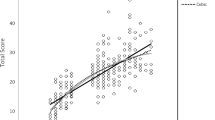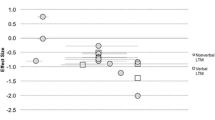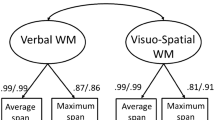Abstract
Neuropsychological investigation of the development of the mnesic function in mental retardation has primarily focused on evaluating short-term memory (STM). Studies have often documented a reduced verbal short-term memory span in individuals with mental retardation and with Down syndrome in particular, compared to groups of mental age-matched controls. However, recent evidence suggests that verbal short-term memory is not equally impaired in all individuals with mental retardation. Findings in children with Williams syndrome are particularly relevant in this regard. Also, data concerning STM for visual information suggest that visual-object and visual-spatial working memory may be differently compromised in people with mental retardation. In particular, individuals with Williams syndrome exhibit specific difficulties in visual-spatial but not in visual-object working memory tasks compared to typically-developing children matched for mental age. Instead, people with Down syndrome show reduced performance in both visual-spatial and visual-object tests. Taken together, these results reinforce the view that intellectual disability is not a unitary condition characterized by homogeneous slowness of cognitive development but a variety of conditions in which some cognitive functions may be more disrupted than others. The finding that the working memory deficit in individuals with Williams and Down syndrome may be qualitatively differentiated also supports the hypothesis that it is not simply a manifestation of general cognitive impairment but, rather, the expression of a specific deficit of a discrete cognitive ability.
Similar content being viewed by others
References
Atkinson, J., King, J., Braddick, O., Nokes, L., Anke, S., & Braddick, F. A. (1997). Specific deficit of dorsal stream function in Williams syndrome. NeuroReport, 8, 1919–1922.
Atkinson, R. C., & Shiffrin, R. M. (1971). The control of short-term memory. Scientific American, 225, 82–90.
Baddeley, A. D. (1966). Short-term memory for word sequences as a function of acoustic, semantic and formal similarity. The Quarterly Journal of Experimental Psychology, 18, 362–365.
Baddeley, A. D., Della Sala, S., & Spinnler, H. (1991). The two-component hypothesis of memory deficit in Alzheimer’s disease. Journal of Clinical and Experimental Neuropsychology, 13, 372–380.
Baddeley, A. D., & Hitch, G. (1974). Working Memory. In G. H. Bower (Ed.), The psychology of learning and motivation, Vol. 8, pp. 47–90.
Baddeley, A. D., Thomson, N., & Buchananm, M. (1975). Word-length and the structure of short term memory. Journal of Verbal Learning and Verbal Behavior, 14, 575–589.
Baddeley, A. D. (1986). Working memory. London: Oxford University Press.
Baddeley, A. D., Wilson, B., & Kopelman, M. (2002). Handbook of memory disorders (pp. 501–518). John Wiley and Sons, Ltd.
Baddeley, A. D., & Warrington, E. K. (1970). Amnesia and the distinction between long and short-term memory. Journal of Verbal Learning and Verbal Behavior, 9, 176–189.
Basso, A., Splinner, H., Vallar, G., & Zanobio, M. E. (1982). Left hemisphere damage and selective impairment of auditory verbal short-term memory. A case study. Neuropsychologia, 20, 263–274.
Bellugi, U., Marks, S., Bihrle, A. M., & Sabo, H. (1988). Dissociation between language and cognitive functions in Williams syndrome. In J. Stiles, M. Kritchevsky, & U. Bellugi (Eds.), Spatial cognition: Brain bases and development (pp. 273–298). Hillsdale, NJ: Lawrence Erlbaum Associates.
Bellugi, U., Bihrle, A., Jernigan, T., Trauner, D., & Doherty, S. (1990). Neuropsychological, neurological and neuroanatomical profile of Williams Syndrome. American Journal of Medical Genetics, Supplement, 6, 115–125.
Bellugi, U., Wang, P. P., & Jernigan, T. L. (1994). Williams’s syndrome: An unusual neuropsychological profile. In S. H. Broman & J. Grafman (Eds.), Atypical cognitive deficits in developmental disorders: Implications for brain function (pp. 23–56). Hillsdale, NJ: Erlbaum.
Bellugi, U., Mills, D., Jernigan, T., Hickock, G., & Galaburda, A. (1999). Linking cognition, brain structure, and brain function in Williams Syndrome. In H. Tager-Flusberg (Ed.), Neurodevelopmental disorders (pp. 111–154). Cambridge, MA: MIT Press.
Bishop, D. (1999). An innate basis for language. Science, 286, 2283–2284.
Brown, J. K., Johnson, M. H., Paterson, S. G., Gilmore, R., Longhi, E., & Karmiloff-Smith, A. (2003). Spatial representation and attention deficit in toddlers with Williams Syndrome and Down Syndrome. Neuropsychologia, 1, 1–10.
Chapman, R. S. (1995). Language development in Children and Adolescents with Down Syndrome. In P. Fletcher & B. MacWhinney (Eds.), The handbookh of child language (pp. 641–663). Oxford: Blackwell.
Conrad, R., & Hull, A. J. (1964). Information, acoustic confusion and memory span. British Journal of Psychology, 55, 429–432.
Courtney, S. M., Petit, L., Maisog, J. M., & Haxby, J. V. (1998). An area specialized for spatial working memory in human frontal cortex. Science, 279, 1347–1351.
Della Sala, S., Gray, C., Baddeley, A. D., Allamano, M., & Wilson, L. (1999). Pattern span: A tool for unwelding visuo-spatial memory. Neuropsycologia, 37, 1189–1199.
Della Sala, S., & Logie, R. H. (2002). Neuropsychological impairments of visual and spatial working memory. In A. D. Baddeley, B. Wilson, & M. Kopelman (Eds.), Handbook of memory disorders (pp. 271–292). Chichester: John Wiley and Sons.
De Renzi, R., & Nichelli, P. (1975). Verbal and non-verbal short-term memory impairment following hemispheric damage. Cortex, 11, 341–353.
Detterman, D. K. (1987). Theoretical notions of intelligence and mental retardation. American Journal of Mental Deficiency, 92, 2–11.
Dodd, B. (1975). Recognition and reproduction of words by Down’s syndrome and non-Down’s syndrome retarded children. American Journal of Mental Deficiency, 80, 306–311.
Ellis, N. R. (1978). Do the mentally retarded have poor memory? Intelligence, 2, 41–54.
Farran, E. K., Jarrold, C., & Gathercole, S. E. (2001). Block design performance in the Williams syndrome phenotype: A problem with mental imagery? Journal of Child Psychology and Psychiatry, 42, 719– 728.
Fowler, A. E. (1995). Language variability in persons with Down syndrome. In L. Nadel & D. Rosenthal (Ed.), Down syndrome: Living and learning in the community. New York: Wiley-Liss.
Gathercole, S. E., & Baddeley, A. D. (1993). Working memory and language. Hove, UK: Lawrence Erlbaum.
Gathercole, S. E., Willis, C., Baddeley, & Emslie, H. (1994). The children’s test of Nonword repetition: A test of phonological memory. Memory, 2, 103–127.
Grant, J., Karmiloff-Smith, A., Gathercole, S. A., Paterson, S., Howlin, P., Davies, M., & Udwin, O. (1997). Phonological short-term memory and its relationship to language in Williams syndrome. Cognitive Neuropsychiatry, 2, 81–99.
Hester, R. L., Kinsella, G. J., & Ong, B. (2004). Effect of age on forward and backward span tasks. Journal of International Neuropsychology Society, 10, 475–481.
Hulme, C., Maughaun, S., & Brown, G. D. A. (1991). Memory for familiar and unfamiliar words: Evidence for a long-term memory contribution to short-term memory span. Journal for memory and language, 30, 685–701.
Hulme, C., & Mackenzie, S. (1992). Working memory and severe learning difficulties. Hove: Lawrence Erlbaum Associates.
Jarrold, C., & Baddeley, A. D. (1997). Short-term memory for verbal and visuospatial information in Down’s syndrome. Cognitive Neuropsychiatry, 2(2), 101–122.
Jarrold, C., Baddeley, A. D., & Hewes, A. K. (1999). Dissociating working memory: Evidence from Down’s and Williams Syndrome. Neuropsychologia, 37, 637–651.
Jarrold, C., Baddeley, A. D., & Hewes, A. K. (2000). Verbal short-term memory deficits in Down syndrome: A consequence of problems in rehearsal? Journal of Child Psychology and Psychiatry, 40(2), 233–244.
Jernigan, T. L., Bellugi, U., Sowell, E., Doherty, S., & Hesselink, J. R. (1993). Cerebral morphologic distinctions between Williams syndrome and Down syndrome. Archives of Neurology, 50, 186–191.
Kanno, K., & Ikeda, Y. (2002). Word-length effect in verbal short-term memory in individuals with Down’s syndrome. Journal of Intellectual Disability Research, 46, 613–618.
Karmiloff-Smith, A., Grant, J., Berthoud, I., Davies, M., Howlin, P., & Udwin, O. (1997). Language and Williams syndrome: How intact is “intact.” Child Development, 68, 274–290.
Karmiloff-Smith, A., Tyler, L. K., Voice, K., Sims, K., Udwin, O., & Howlin, P. D. (1998). Linguistic dissociation in Williams syndrome: Evaluating receptive syntax in on-line and off-line tasks. Neuropsychologia, 36, 343–351.
Kay-Raining Bird, E., & Chapman, R. S. (1994). Sequential recall in individuals with Down Syndrome. Journal of Speech and Hearing Research, 37, 1369–1380.
Klein, B. P., & Mervis, C. B. (1999). Contrasting patterns of cognitive abilities of 9-and 10- years olds with Williams syndrome or Down syndrome. Developmental Neuropsychology, 16, 177–196.
Laws, G. (2002). Working memory in children and adolescents with Down syndrome: Evidence from a colour memory experiment. Journal of Child Psychology and Psychiatry, 43, 353–364.
Laws, G., & Gunn, D. (2003). Phonological memory as a predictor of language comprehension in Down syndrome: A five-year follow-up study. Journal of Child Psychology and Psychiatry, 44, 1–11.
Laws, G. (2004). Contributions of phonological memory, language comprehension and hearing to the expressive language of adolescents and young adults with Down syndrome. Journal of Child Psychology and Psychiatry, 45, 1–11.
Logie, R. H. (1995). Visuo-spatial working memory. Hove: Lawrence Erlbaum Associates.
Marcell, M. M., & Weeks, S. L. (1988). Short-term memory difficulties and Down’s syndrome. Journal of Mental Deficiency Research, 32, 153–162.
Majerus, S., Barisnikov, K., Vuillemin, I., Poncelet, M., & Van der Linden, M. (2003). An investigation of verbal short-term memory and phonological processing in four children with Williams syndrome. Neurocase, 9(5), 390–401.
McDade, H. L., & Adler, S. (1980). Down syndrome and short-term memory impairment: A storage or retrieval deficit? American Journal of Mental Deficiency, 84, 561–567.
Mervis, C. B., Morris, C. A., Bertrand, J., & Robinson, B. F. (1999). Williams syndrome: Findings from an integrated program of research. In H. Tager-Flusberg (Ed.), Neurodevelopmental disorders (pp. 65–110). Cambridge, MA: MIT Press.
Mervis, C. B., Robinson, B. F., Rowe, M. L., Becerra, A. M., & Klein-Tasman, B. T. (2004). Relation between language and cognition in Williams syndrome. In S. Bartke & J. Siegmuller (Eds.), Williams syndrome across languages (pp. 63–92). Philadelphia, PA: John Benjamins Publishing Company.
Nelson, C. A., Monk, C. S., Lin, J., Carver, L. J., Thomas, K. M., & Truwit, C. L. (2000). Functional neuroanatomy of spatial working memory in children. Developmental Psychology, 36(1), 109–116.
Paterson, S. J., Brown, H. J., Gsodl, M. K., Jhonson, M. H., & Karmiloff-Smith, A. (1999). Cognitive modularity and genetic disorders. Science, 286, 2355–2358.
Pezzini, G., Vicari, S., Volterra, V., Milani, L., & Ossella, M. T. (1999). Children with Williams Syndrome: Is There a Unique Neuropsychological Profile? Developmental Neuropsychology, 15(1), 141– 155.
Pleah, C., Lukàcs, A., & Racsmàny, M. (2003). Morphological patterns in Hungarian children with Williams syndrome and the rule debates. Brain and Language, 86, 377–383.
Reilly, J., Kline, E. S., & Bellugi, U. (1990). Once more with feeling: Affect and language in atypical populations. Developmental Psychopathology, 2, 367–391.
Reiss, A. L., Eliez, S., Schmitt, J. E., & Straus, E. (2000). Neuroanatomy of Williams syndrome: A high-resolution MRI study. Journal of Cognitive Neuroscience, 12, 65–73.
Robinson, B. F., Mervis, C. B., & Robinson, M. (2003). The role of Verbal Short-term Memory and Working Memory in Acquisition of Grammar by Children with Williams Syndrome. Developmental Neuropychology, 23(1–2), 13–31.
Seung, H. K., & Chapman, R. (2000). Digit span in individuals with Down syndrome and typically developing children: Temporal aspects. Journal of Speech, Language, Hearing Research, 43, 609–620.
Seung, H. K., & Chapman, R. (2004). Sentence memory of individuals with Down syndrome and typically developing children. Journal of Intellectual Disabilty Research, 48, 160–171.
Shallice, T., & Warrington, E. K. (1970). Independent functioning of verbal memory stores: A neuropsychological study. The Quarterly Journal of Experimental Psychology, 22, 261–273.
Silveri, M. C., Di Betta, A. M., Filippini, V., Leggio, M., & Molinari, M. (1998). Verbal short-term store-rehearsal system and the cerebellum. Evidence from a patient with a right cerebellar lesion. Brain, 121, 2175–2187.
Smith, E., & Jonides, J. (1999). Storage and executive processes in the frontal lobes. Science, 283, 1657–1661.
Smith, E. E., Jonides, J., & Koeppe, R. A. (1996). Dissociating verbal and spatial working memory using PET. Cerebral Cortex, 6, 11–20.
Tomaiuolo, F., Di Paola, M., Caravale, B., Vicari, S., Petrides, M., & Caltagirone, C. (2002). Morphology and morphometry of the corpus callosum in Williams Syndrome: A magnetic resonance imaging analysis. NeuroReport, 13, 1–5.
Udwin, O., & Yule, W. (1990). Expressive Language of Children with Williams Syndrome. Am Journal of Medical Genetics, 6, 108–114.
Vallar, G., & Papagno, C. (1995). Neuropsychological impairments of short-term memory. A neuropsychological case study. Cortex, 27, 323–326.
Vallar, G., & Shallice, T. (1990). Neuropsychological impairments of short term-memory. Cambridge: Cambridge University Press.
Vicari, S., Albertini, G., & Caltagirone, C. (1992). Cognitive profiles in adolescents with mental retardation. Journal of Intellectual Disability Research, 36, 415–423.
Vicari, S., & Carlesimo, G. A. (2002). Children with Intellectual Disabilities. In A. Baddeley, B. Wilson, & M. Kopelman (Eds.), Handbook of memory disorders (pp. 501–518). John Wiley and Sons, Ltd.
Vicari, S., Bates, E., Caselli, M. C., Pasqualetti, P., Gagliardi, C., Tonucci, F., & Volterra, V. (2004). Neuropsychological profile of Italians with Williams syndrome: An example of a dissociation between language and cognition? Journal of International Neuropsychology Society, 10, 862–876.
Vicari, S., Carlesimo, G. A., & Caltagirone, C. (1995). Short-term memory in persons with Intellectual Disabilities and Down Syndrome. Journal of Intellectual Disability Research, 39(6), 532–537.
Vicari, S., Carlesimo, G. A., Brizzolara, D., & Pezzini, G. (1996a). Short-term memory in children with Williams syndrome: A reduced contribution of lexical- semantic knowledge to word span. Neuropsychologia, 34(9), 919–925.
Vicari, S., Brizzolara, D., Carlesimo, G. A., Pezzini, G., & Volterra, V. (1996b). Memory abilities in children with Williams syndrome. Cortex, 32, 503–514.
Vicari, S., Bellucci, S., & Carlesimo, G. A. (2003). Visual and spatial working memory dissociation: Evidence from a genetic syndrome. Dev. Med. Child Neurol., 45, 269–273.
Vicari, S., Bellucci, S., & Carlesimo, G. A. (2005). Visual and Spatial long-term memory: Differential pattern of impairments in Williams and Down syndromes. Developmental Medicine and Child Neurology, 47, 305–311.
Volterra, V., Capirci, O., Pezzini, G., Sabbadini, L., & Vicari, S. (1996). Linguistic abilities in Italian Children with Williams Syndrome. Cortex, 32, 663–677.
Wang, P. P., & Bellugi, U. (1994). Evidence from Two Genetic Syndromes for a Dissociation between Verbal and Visual-Spatial Short-Term Memory. Journal of Clinical and Experimental Neuropsychology, 16(2), 317–322.
Author information
Authors and Affiliations
Corresponding author
Rights and permissions
About this article
Cite this article
Vicari, S., Carlesimo, G.A. Short-Term Memory Deficits Are Not Uniform in Down and Williams Syndromes. Neuropsychol Rev 16, 87–94 (2006). https://doi.org/10.1007/s11065-006-9008-4
Received:
Accepted:
Published:
Issue Date:
DOI: https://doi.org/10.1007/s11065-006-9008-4




